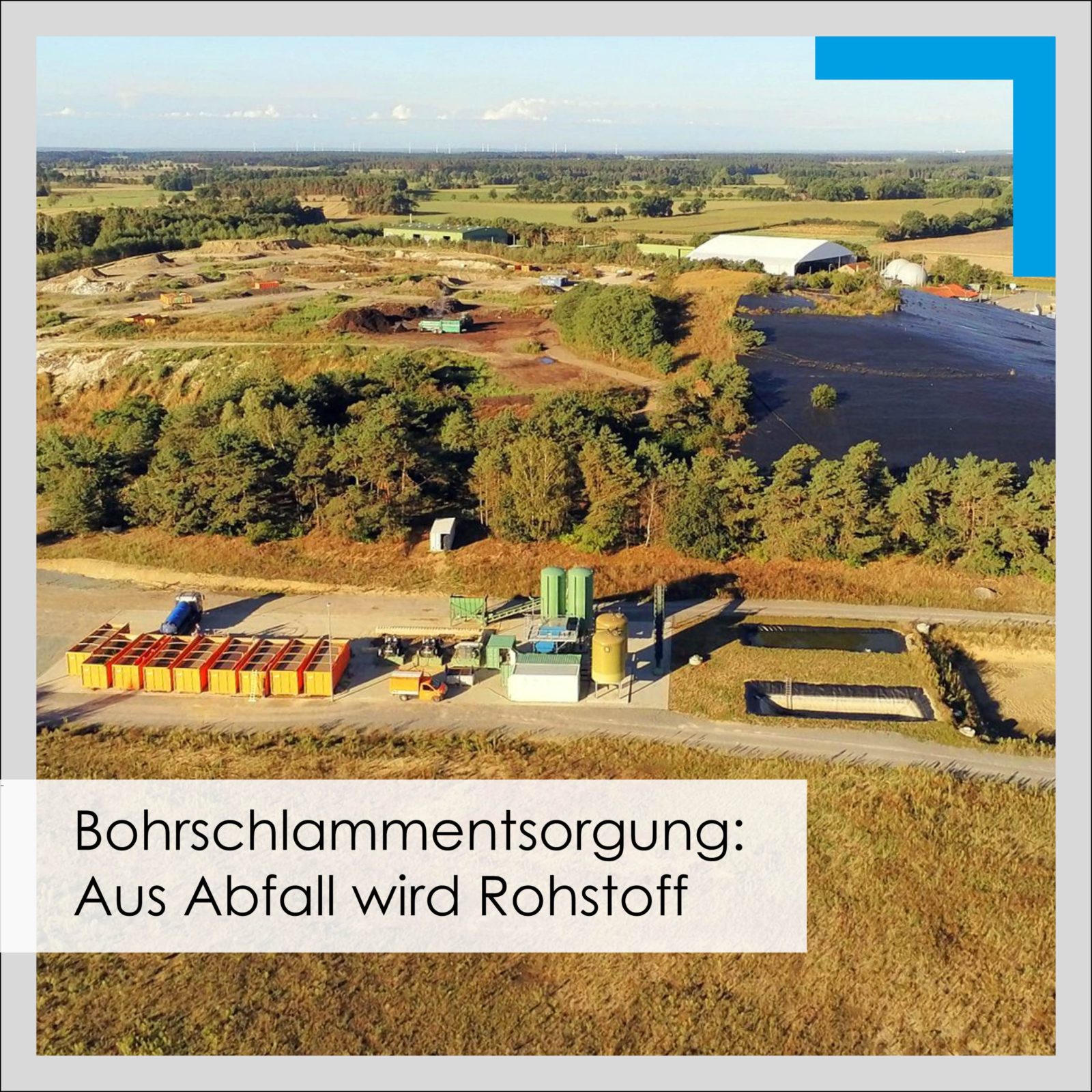Drilling mud disposal in Uelzen: Waste becomes raw material
Abfallwirtschaftsbetrieb (AWB) Uelzen operates innovative processing plant
Horizontal drilling supported the expansion of the fibre optic network in the district of Uelzen. However, the advantageous laying of lines produces drilling muds that may neither be recycled nor disposed of without treatment. On-site seepage is just as impermissible as the long-practiced application on agricultural land.
The waste management company of the district of Uelzen (AWB) in Borg has solved the disposal problem. Since September 2019, a nationwide unique multi-stage plant configuration with a sophisticated "up-cycling" has been in operation. The drilling mud is turned into valuable material streams for new use. The AWB is self-sufficient in energy. The innovative plant technology is operated entirely with self-produced electricity from biowaste.
The exploitation requirement
Drilling muds are waste subject to the requirements of the Closed Substance Cycle Waste Management Act (KrWG). With the decree of 7 August 2015, the Lower Saxony Ministry for the Environment, Energy and Climate Protection prohibited the practised, uncontrolled disposal of drilling muds from horizontal boreholes. In Lower Saxony, only isolated treatment facilities were available even for uncontaminated drilling muds, so that disposal was associated with high transport costs and considerable traffic emissions in addition to the acceptance fees.
The search for a legally compliant and proportionate disposal route prompted the AWB to tackle the problem with its own resources. With the locational advantage of its own landfill of landfill class II at the Borg disposal centre, the AWB considered disposing of the mineral-rich drilling muds on site in 2018. Through a market analysis, the AWB found a user in the form of the company Max Wild from Baden-Württemberg, which combines the processing of the drilling muds with the recovery of the drilling slurry. The double effect and the treatment processes were convincing because they are adapted to the special properties of the drilling muds.
Positive contributions to the environmental balance
In addition to reducing disposal costs, the AWB was also concerned with the positive contributions to the environmental balance: Shorter transport routes reduce traffic pollution and CO2 emissions. Processing the waste for recycling closes the material cycles and saves landfill volume. Last but not least, the environmental benefits persuaded the district's operating committee to decide in favour of the investment in 2018. With this decision, the project could begin, at a cost of € 1.4 million for the plant and € 400,000 for the infrastructure.
Depending on the recycling objective, the drilling muds go through different process stages:
- Sieve separation for separation of the drill cuttings
- Centrifuge for the separation of coarse mineral particles
- Optional: recycling or waste water treatment
3.1 Mixing station for preparing a secondary rinse
3.2 Flocculation station and lamella clarifier for sedimentation of the particles - Conditioning, e.g. for the production of concrete blocks or to improve the recycling properties,
- Wastewater treatment
Even after completion of the fibre optic network, the Borg landfill site offers planning and disposal security to other project developers as a location for drilling mud processing. At the same time, the plant operation has so far fallen short of its potential. Both in terms of capacity and recycling management. The drilling muds from horizontal wells are obviously still often on unknown disposal routes.
The options of the plant bring with them environmental advantages that are particularly in line with the high-level recycling required by waste legislation, also for future projects. With a treatment system that is both capable of recovering the drilling slurry for reuse and conditioning the drilling muds that can no longer be used in the drilling process for recycling the mineral solids.
#mullandpartner #engineeringforabettertomorrow #whatwedo #hannover #upcycling
Our business areas
Environmental and geotechnical engineering
Construction and project management
Renewable energies
Real estate development
Infrastructure
Water management
Our business areas
Environmental and geotechnical engineering
Construction and project management
Renewable energies
Real estate development
Infrastructure
Water management
Our business areas
Environmental and geotechnical engineering
Construction and project management
Renewable energies
Real estate development
Infrastructure
Water management
Our companies
M&P Engineering Company
M&P Engineering Company Munich
T&P Beratende Ingenieure
P&P Real Estate Consulting
P&B Real Estate Management
P&M Project Management
M&P Umwelttechnik
Please contact us
Follow us on

